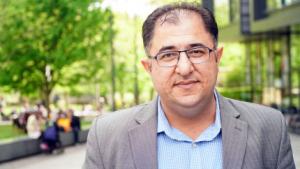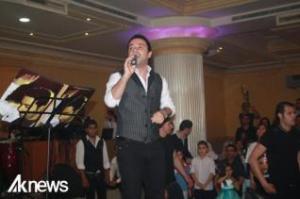
Syrian Novelist Haitham Hussein on Writing Kurdish Stories into Arabic Literature

Haitham Hussein‘s latest novel, A Weed in Paradise (July 2017 Masciliana Editions), traces the footprints of the Kurds who fled their towns and villages in the north of Syria for the suburbs of the capital Damascus after the 2004 Qamishli uprising, which resulted in dozens of dead and thousands in prison:
The novel, narrated by a marginalized woman, follows the changes in this alienated and internally displaced community, who soon had to confront clashes between the regime and the armed groups opposed to it. The displaced, according to the book’s promotional material, thus found themselves victims of another displacement, and new displacement to different destinations.
The novel, published this month, fights to preserve Kurdish memory and identity.
Haitham Hussein answered a few questions, via email, about why he chose a woman protagonist, how he did the research for his novel, and how he keeps pushing his fiction forward.
Why did you choose this particular woman as your protagonist to tell these stories?
Haitham Hussein: This is the second time I’ve chosen a woman to be the protagonist of my novel.
In my second novel, Hostages of Sin, I chose the character of an old woman, Khatuna, to play a leading role in a reality where most men consider themselves masters of the world or those who are executing the difficult and great missions in this life. These men consider woman to be a bent rib that cannot perform her human and social duties as it should. Thus, my choice of a woman figure as the protagonist of my new novel supports and recognizes women’s great role. I tried to give her more space to express herself, her thoughts, dreams and pains in response to the injustice to which she is subjected — the kind of injustice that deprives her of the most basic rights. My choice is an endeavor for women’s liberation from oppression and marginalization. There are those who seek to impose more restrictions on them, especially the extremists and fundamentalists who hold worn-out ideas and consider themselves women’s guardians. They look at women as more or less a sex machine meant for pleasure and for home services only, without paying attention to her desires. Consequently, you’d see our communities live in the swamps of ignorance and underdevelopment.
Many men in the region consider that, when a woman gets her rights, she may pose a danger to their imaginary paradise, which, at the same time, is nothing but hell for a woman.
How was this novel a shift, in terms of subject and style, from your previous works?
HH: As a novelist, I take advantage of my previous experiences and readings in a renewed manner. I try to renew my artistic methods and work on novel experiment and innovation. I always feel that there are new artistic lines that I am looking for and I try to apply them to my work. In this novel, for example, I was keen to approach a part of the contemporary Kurdish history and presence of Kurds in the Syrian landscape, in the past and present, and the narrow view that besieged them — the result of the Syrian regime’s decades-long chauvinist policy.
The Syrian regime created a perception among the Syrian ethnicities, especially Arabs, that the Kurds are a threat to them, and they are separatist, a dagger in the body-politic of Arab nation. All these words, which come out of a hateful approach, do not take into account the most basic rules of human rights. I have been faced with the challenge of presenting political tragedies with an interesting and enjoyable artistic style for the reader, so that they don’t feel the heavy effect of politics and its burdens at work, without detracting from the literary value and the literary linguistic level. I find this work complementary to what I started in previous works, in terms of caring about the humanist side. I believe in the power of literature and art in the face of hatred and grudges.
Did you also move to the suburbs of Damascus in 2004? Do the stories stem from what you witnessed, from interviews or discussions with others, from your imagination, all of these?
HH: I did not move after 2004 directly to Damascus or its suburbs. Some of my family, a sister and her children, my brother and a number of relatives and friends moved in. After that, we all moved: my mother, my father and my younger brothers. My wife and I moved after our marriage in 2008. I was in direct contact with them on a daily basis, as I was visiting them from time to time and staying with them for days or weeks. Also, I witnessed many social variables in that area and at that time. After moving completely, I lived daily with the details of the life of the various displaced peoples. They tried to follow a different lifestyle. They tried to adapt themselves to the strange model imposed upon them, or else stay clearly strangers over there. There was a kind of loss of identity and loss of compass. The commitment to values ended. I felt that the humanist identity of the Kurd, and especially the Kurdish personality, loses its features. This loss was a feature of a full stage in their life.
And after that loss, they faced another loss, but a more fiercely and deeply painful one. We lost the place and entered the deadly war tunnel.
Both as a novelist and a critic, what literary work – particularly Syrian and Syrian Kurdish – do you find your work in conversation with, building on?
HH: I find my work as a novelist supplemented by the details in the scenes of Syrian life, especially the Syrian Kurds’ life, which is absent from the works of Syrian Arab novelists who do not attach any importance to the Kurds in their narrative works. They know little about the details of the lives of the Syrian Kurds. They deal with them in a different logic. There are many barriers preventing them from approaching and portraying some important aspects of Syrian Kurds’ life. This is reflected in the relationship between the Kurdish reader who reads in Arabic with the Syrian Arab writer.
There is a gap of misunderstanding and a lack of communication between them. The Syrian revolution came to repair some imbalances in this relationship. My novels come as a contribution to promoting communication and dialogue among the Syrian society, all of them, whether Arabs or Kurds, Muslims, or Christians. Each part must accept the other and not abuse the others’ rights.
Are stories healing? Or, put otherwise, why is it important to remember?
HH: I believe that stories can contribute to the restoration of the relationship between someone and their past, as well as their surroundings, and between the people of society itself when they read with an open heart and a conscious mind, away from the accumulated hatreds.
Thus it provides a way to heal from the past ills and allows a society not to be drown in other tragedies and therefore engender new problems. The stories contribute to lighting some places of darkness, injustice, and hatred. It is very important to remember one’s history and past in order to not break away from himself and his identity — to be able to reconcile with his reality and to move towards his future with force and boldness away from the mistakes of his past.
I don’t find that history is a science of the past. To me, it is the science of the future. I think that memory remains a person’s most reliable weapon in their life and in the struggle for their future. Whoever is deprived of memory is deprived of identity, living in loss and failing to arrange one’s relationship with oneself before arranging it with others.
Translation and support from Abdullah Mezar Hussein, a Syrian journalist who lives and works in the UAE.
Novelist Haitham Hussein was born in 1978 in Amuda, Syria, and works as a freelance journalist and critic in Edinburgh, Scotland. Hussein has written several novels, including Aram: the Descendant of Unspoken Pains (2007), Hostages of Sin (2010), which translated into Czech in 2016, and Needle of Horror (2014). He has also written critical works and founded the website http://alriwaya.net. Read more about his work at www.facebook.com/haitham1hussein.
BY MLYNXQUALEY on JULY 25, 2017 • ( 2 )
Arabic Literature (in English)
- 3803 reads


